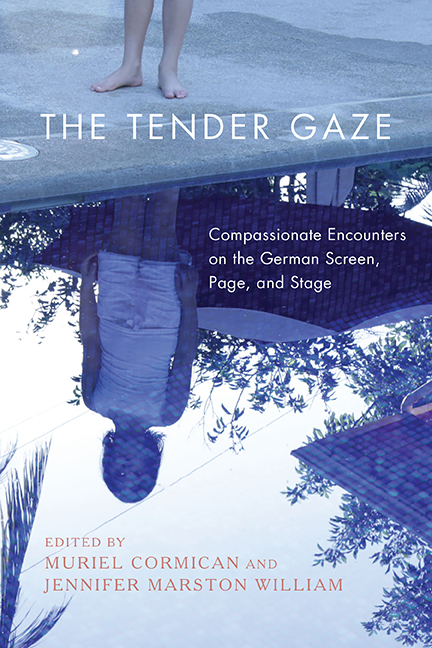Book contents
- Frontmatter
- Contents
- Acknowledgments
- Introduction: The Tender Gaze
- 1 Toward a Theory of the Tender Gaze: Affect, Critical Insight, and Empathy in Contemporary German Cinema
- 2 The Tender Gaze, Embodied Politics, and Perspective-Taking in German Postdramatic Theater
- 3 Face to Face: Race, Gender, and the Gaze in Mo Asumang’s Die Arier
- 4 “Risse, hinter denen man einen Kern entdeckt, der so ähnlich ist wie die Herzen von uns allen”: The Tender Gaze in Umut Dağ’s Risse im Beton
- 5 Looking through the Eyes of Empathy: Encouraging a Culture of Caring and Compassion in Doris Dörrie’s Keiner liebt mich
- 6 The Tender and Transgressive Beast Within: Escape Narratives in Films by Krebitz, Stuber, and Speckenbach
- 7 Looking at Looking in Margarethe von Trotta’s Das Versprechen
- 8 A Queer Phenomenology of Gender in Maren Ade’s Alle Anderen and Toni Erdmann
- 9 Rilke’s “Schauen”
- 10 Pity Stares or Tender Gaze? Seeing Disability in Nineteenth-Century Austrian and German Literature
- 11 The Sociohistorical and Gendered Implications of Gazing Tenderly in Ludwig Tieck’s “Liebeszauber”
- 12 Mothering, Animals, and the Surveillance State in the Anthropocene: An Ecofeminist Reading of Birgit Vanderbeke’s Die Frau mit dem Hund
- Notes on the Contributors
- Index
7 - Looking at Looking in Margarethe von Trotta’s Das Versprechen
Published online by Cambridge University Press: 05 October 2022
- Frontmatter
- Contents
- Acknowledgments
- Introduction: The Tender Gaze
- 1 Toward a Theory of the Tender Gaze: Affect, Critical Insight, and Empathy in Contemporary German Cinema
- 2 The Tender Gaze, Embodied Politics, and Perspective-Taking in German Postdramatic Theater
- 3 Face to Face: Race, Gender, and the Gaze in Mo Asumang’s Die Arier
- 4 “Risse, hinter denen man einen Kern entdeckt, der so ähnlich ist wie die Herzen von uns allen”: The Tender Gaze in Umut Dağ’s Risse im Beton
- 5 Looking through the Eyes of Empathy: Encouraging a Culture of Caring and Compassion in Doris Dörrie’s Keiner liebt mich
- 6 The Tender and Transgressive Beast Within: Escape Narratives in Films by Krebitz, Stuber, and Speckenbach
- 7 Looking at Looking in Margarethe von Trotta’s Das Versprechen
- 8 A Queer Phenomenology of Gender in Maren Ade’s Alle Anderen and Toni Erdmann
- 9 Rilke’s “Schauen”
- 10 Pity Stares or Tender Gaze? Seeing Disability in Nineteenth-Century Austrian and German Literature
- 11 The Sociohistorical and Gendered Implications of Gazing Tenderly in Ludwig Tieck’s “Liebeszauber”
- 12 Mothering, Animals, and the Surveillance State in the Anthropocene: An Ecofeminist Reading of Birgit Vanderbeke’s Die Frau mit dem Hund
- Notes on the Contributors
- Index
Summary
USING THE LENS of a feature film to frame her historical interests has been one of Margarethe von Trotta's strengths throughout her career, and this may be part of the reason she has become one of the best-known filmmakers of New German Cinema and “the primary representative of critical German women's film.” Many of her films depict the personal lives of women caught up in the turmoil of their times and emphasize relationships between women. Her films include bio-pics treating the lives of prominent women such as Rosa Luxemburg (1986) or Hannah Arendt (2012), but von Trotta has also created more purely fictional character constellations to illuminate historical periods and subjects: Die bleierne Zeit (Marianne and Julianne, 1981), the co-directed Die verlorene Ehre der Katarina Blum (The Lost Honor of Katarina Blum, 1975), and Schwestern oder die Balance des Glücks (Sisters, or the Balance of Happiness, 1979), for example, examine terrorism in 1970s and 1980s Germany as it reverberates in the lives of female figures. Rosenstrasse (2003) depicts a successful protest during the Third Reich by women who saved their Jewish husbands from deportation. Her 1994 film Das Versprechen (The Promise), the primary focus of this essay, seems less exclusively interested in women's lives and relationships, at least at first glance, but it treats an important and controversial recent historical topic—the Berlin Wall—and constructs a melodramatic love story to make this history personal and palpable to the viewer.
While carrying out a plan to escape from East Berlin into West Berlin soon after the construction of the wall in 1961, Sophie (Meret Becker and Corinna Harfouch) and Konrad (Anian Zollner and August Zirner), two young lovers, are separated. Konrad remains behind in East Berlin and eventually becomes a physics professor of international repute; Sophie becomes the protégée of her aunt in West Berlin, working in the fashion industry. They are able to meet and even live together in Prague for a brief period just before the Prague Spring in 1968. Here, they conceive a child but are then separated again until the fall of the Wall in 1989, with the exception of two brief meetings during a scientific conference in West Berlin that Konrad attends.
- Type
- Chapter
- Information
- The Tender GazeCompassionate Encounters on the German Screen, Page, and Stage, pp. 125 - 142Publisher: Boydell & BrewerPrint publication year: 2021

